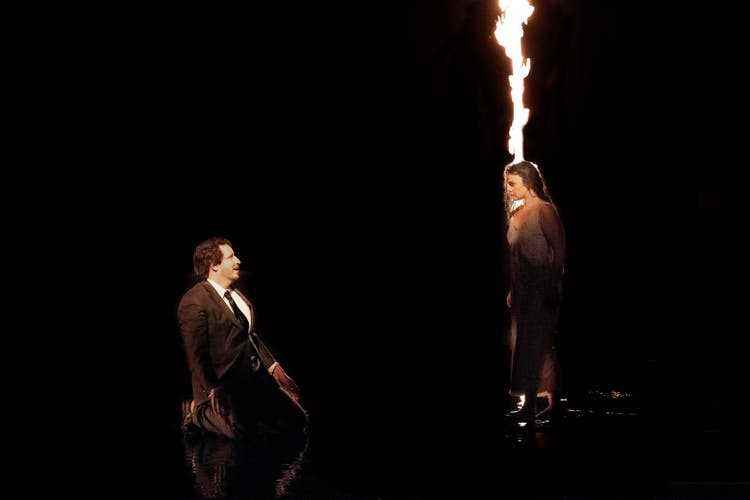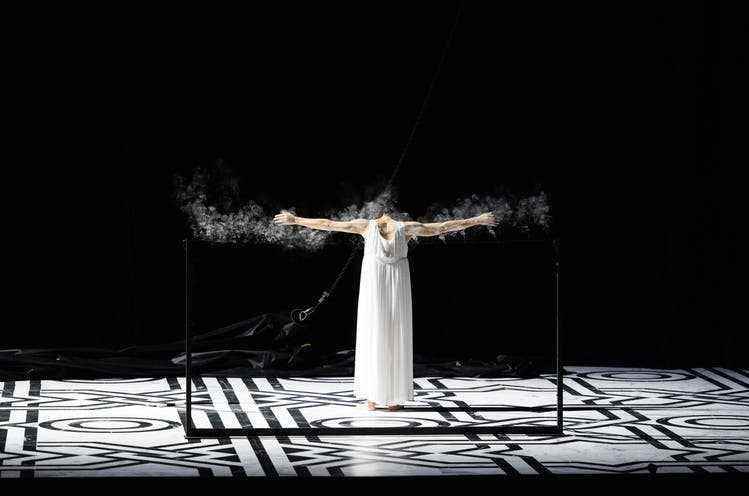Despite controversy surrounding his relations with Russia, Teodor Currentzis is celebrated at the opening premiere in Salzburg. However, a much simpler work steals the show from the ambitious double evening directed by Romeo Castellucci.
Based on Renaissance depictions of the Last Judgment: Scene from Carl Orff’s “De temporum fine comoedia” directed and set by Romeo Castellucci.
Pustakrainer, Bosna, Waldviertler, Debreziner – if you want to get through the packed festival days in Salzburg, you sometimes can’t avoid them: the sausage stands of the street vendors, the hungry visitors to the Mozart city late into the night with carnal delights from all corners Supply Kakaniens. A stand on the Alter Markt, not far from the birthplace of the great Amadé, is traditionally particularly concerned about the physical well-being. After festival performances, clusters of well-dressed people regularly gather in front of the wagon, cheering and biting into rather vulgar sausages. A delicious contradiction!
On this Tuesday evening, however, most culture-hungry people look mighty exhausted. No wonder, since the first opera premiere of the Summer Festival in the Felsenreitschule was about the sausage for almost four hours in the broadest possible sense: about heaven and hell, death and the devil, about love, trust, guilt and betrayal, about beginnings and end of civilization – and incidentally also about the question of the artist’s responsibility in politically heated times.
The real inferno
Markus Hinterhäuser, the artistic director of the Salzburg Festival, who is rightly celebrated for his original program ideas, has reached particularly high this time: to Dante’s “Divine Comedy”, its ideal path of purification per aspera ad astra, from the inferno through purgatory to paradise, has inspired countless works of intellectual history for seven hundred years. The end-time scenario characterizes the selection of works in the opera, while the concert area deals with the meaning of sacrifice under the motto «Sacrificium». Actually a topic that is absolutely suitable for festivals.
What Hinterhäuser couldn’t foresee, however, was the very real inferno that the Russian president’s troopers have been unleashing in Ukraine for more than five months. Since then, the aesthetic game of life and death has been put to the acid test, confronted with a reality shock of completely different, bitterly serious dimensions. Because this war not only has an impact on all of our everyday lives, it also puts a number of customs in the cultural sector and even some established personalities in musical life in a different light.
For example the conductor Teodor Currentzis, who for a long time was admired almost like a cult because of his charismatic appearance and his distinctive interpretations, especially in Salzburg. Hinterhäuser owes the significant successes of his directorship to the native Greek, who still has his artistic center of life in Russia to this day.
For weeks now, however, Hinterhäuser has been confronted with demands to persuade Currentzis to take a clear stance on the Russian attack, which violates international law. Since it became known that Currentzis and his “Musica Aeterna” ensembles apparently benefit to a considerable extent from donations from Russian institutions – including the VTB Bank, which is subject to sanctions in the West, and Gazprom – the audible grumbling in the cultural world has grown into a political storm .
blur
However, Currentzis has not yet made a clear position or even expressed it. He seems to hide behind the maxim that art takes place in an abstract space, detached from the “dirt” of reality, so to speak. Wilhelm Furtwängler, Karl Böhm and others used this beautiful but unfortunately flimsy argument, which stems from the idealistic understanding of art in the 19th century, to justify their sometimes far-reaching involvement with the Nazi regime. Only in the rarest of cases have they found grace in the eyes of posterity.
Significantly, shortly after the outbreak of war, Anna Netrebko also tried to save herself with similar references to the supposedly intact counter-world of art. In Netrebko’s case, it didn’t even take posterity to expose this as an excuse: it was, along with Peter Gelb, the manager of the Metropolitan Opera, and Markus Hinterhäuser of all people, who offered Netrebko this way out with a crystal clear announcement, namely the temporary suspension of all further engagements in Salzburg, has installed. In the case of Currentzis, who may even be closer to the regime in Moscow than Netrebko, Hinterhäuser now seems willing to turn a blind eye.
This lack of clarity does not suit Hinterhäuser, who, as a conscientious and deeply reflective artistic director, has so far maneuvered the festival so confidently through all the shallows of cultural politics. And it goes without saying that Hinterhäuser knows that an artist with unclear connections to a warmongering regime has absolutely no place at the world’s most important music festival – at least as long as he has not himself ensured sufficient transparency with regard to the type and extent of such connections. The tampering of the festival management on this question can only be explained by concern about the important opening premiere, which internally has probably been on the brink more than once.

Flaming realization: Judith (Ausrine Stundyte) seduces Bluebeard (Mika Kares) to see his instincts. Scene from “Bluebeard’s Castle” by Béla Bartók in Salzburg.
retreat
The intellectual and artistic claim of this unusual double evening is indeed enormous: after all, the combination of Béla Bartók’s one-act play “Bluebeard’s Castle” with Carl Orff’s last stage work, “De temporum fine comoedia” is about nothing less than the role of the Evil and the question of guilt and forgiveness in the face of the end of the world.
The director Romeo Castellucci, who has been bringing Salzburg sensational productions for years in association with Currentzis, turns it into a philosophical-religious exercise – visually stunning, beguilingly beautiful in its aesthetic play with the primary elements of fire and water (in the opening Bartók part) and the modeled Renaissance -Representations of the Last Judgment (in Orff’s late mystery play, which Herbert von Karajan premiered here in Salzburg in 1973).
Musically, too, the connection between the two pieces, which actually drift apart stylistically, is extremely suggestive – thanks to the dynamic fine detail, the rhythmic intensification and the never-ending energy that Currentzis kindles with the huge ensemble. The captivatingly motivated Gustav Mahler Youth Orchestra and the three participating choirs are spread across the entire Felsenreitschule and ensure an overwhelming surround sound experience.
Music theater that touches
Nevertheless, after a while, fatigue sets in, because the innermost part of this evening remains strangely empty – also because hardly any living figures are shown here, but mainly philosophical theses are exemplified. Only the great soprano Ausrine Stundyte gains shape as Judith, who in the first part seduces Bluebeard into admitting his potentially murderous instincts before she is allowed to bring the apple back from the tree of knowledge to the paradise of the innocent as a kind of exonerated Eve at the end of the Orff part.

Judith (Ausrine Stundyte) returns to the paradise of the innocent as a pardoned Eve: Scene from «De temporum fine comoedia».
There is no question that this is theologically incredibly profound, and you probably need more than one Debreziner or Pustakrainer to even come close to coming to terms with it. At some point, however, one also wonders whether music theater doesn’t have a few more urgent problems to deal with in our troubled times. The second opera premiere of the festival provides a gripping answer, the merely concert performance, but all the more haunting performance of Wolfgang Rihm’s chamber opera “Jakob Lenz” in the Mozarteum.
The play about the gradual mental breakdown of Goethe’s contemporary Lenz, who was probably suffering from schizophrenia, could just as easily appear as l’art pour l’art like the evening at the Felsenreitschule. But Georg Nigl, who, with his outstanding ability to differentiate, completely immerses himself in the title role, and the ensemble Le Balcon under Maxime Pascal make much more of this introspection than an oppressive case study.
They reverse the perspective, so to speak, and show us a person who, out of the deepest existential disturbance, breaks out in a primal cry of despair with the very first bars and, in view of the madness in the world, cannot stop crying for the next seventy minutes and to complain. It hurts, it upsets you. This is how musical theater works that touches you directly.
